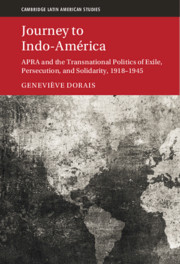‘In this engaging and well-researched book, Geneviève Dorais shows convincingly that we need to broaden our scope beyond the national, as well as beyond hagiographic and demonising narratives, if we are to understand the history of APRA, one of Latin America’s most important political movements.’
Paulo Drinot - Professor of Latin American History, University College London
‘Dorais’ book is an outstanding methodological and conceptual contribution to understanding twentieth century Latin American political processes beyond national boundaries. The APRA’s experience is a tremendous point of departure in writing the history of the Latin Americanist left.’
Aldo Marchesi - Universidad de la República
‘Geneviève Dorais has written a model transnational history, showing how local and global politics determine each other. Drawing on a remarkable range of archives across three continents, Dorais casts new light on the American Popular Revolutionary Alliance, as it mutated from a radical and influential movement around Latin America to an embattled centrist political party in Peru.’
Sinclair Thomson - New York University
‘… a welcome addition to the history of the Latin American left and interwar transnational political movements more generally. Dorais’ book is an example of interdisciplinary analysis done well and with a clear purpose.’
Mark J. Petersen
Source: Journal of Interdisciplinary History
‘… the contributions of the hypothesis and the problems addressed by the book, backed by extensive archival work, are undeniable. Dorais’s investigation will surely transform itself into an unavoidable reference for future investigation on the topic.’
Leandro Sessa
Source: H-LatAm (translated from Spanish)
‘Dorais’s book is a welcome addition to the most recent scholarship on APRA’s transnational dimension. The author convincingly argues that we must take seriously the experience of exile to understand the history of APRA and has modeled an effective methodology for doing so. Hopefully this work will inspire others to pursue similar lines of research to further uncover the intricacies of the transnational networks that stretched throughout the Americas during these crucial decades in world politics.’
Inigo Garcıa-Bryce
Source: Hispanic American Historical Review



